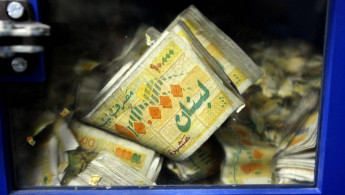The Lebanese pound had been pegged to the dollar at 1,500 since 1997 but the country's worst economic crisis since the 1975-1990 civil war has seen its value plummet.
On Tuesday, it was trading at nearly 10,000 pounds to the dollar on the black market, money exchangers told AFP.
"It's crazy what's happening," one money exchanger said on condition of anonymity.
Before the latest hit, the pound had briefly stabilised at 8,000-8,500 to the greenback in recent weeks.
In July, it had reached 9,800 to the dollar.
The dizzying depreciation came as Lebanon's central bank started reviewing the country's banks under international pressure for banking sector reform.
Lebanese banks had been given until Sunday to increase their capital by 20 percent, among a series of demands from the central bank.
On Monday, a central bank committee "agreed on a roadmap with deadlines for the Bank of Lebanon to take appropriate measures" if these requirements were not met, it said in a statement.
Lebanon's Al-Akhbar newsaper said on Tuesday that the currency plunge was partly the result of commercial banks sucking dollars out of the market to meet the capital demands of the central bank.
The slide in the value of the pound has led to soaring food prices in a country where more than half of the population now lives below the poverty line.
Lebanon has been without a fully functioning government since outgoing premier Hassan Diab resigned in the wake of a devastating explosion in Beirut port last year.
The blast killed more than 200 people and piled new misery on a country already brought to its knees by the economic crisis.
The hashtags #dollar and #blackmarket were trending in Lebanese Twitter circles on Tuesday.
"The exchange rate reached 10,000 LBP and still no government," said one Twitter user.
Mahya Yahya of Carnegie's Middle East Centre echoed the sentiment.
"Meanwhile #Lebanon's Lira collapses further - political deadlock continues and no policies to stem the collapse!" she said.





 Follow the Middle East's top stories in English at The New Arab on Google News
Follow the Middle East's top stories in English at The New Arab on Google News


![22 Arab countries at COP29 have rejected the targeting of fossil fuels [Getty]](/sites/default/files/styles/image_330x185/public/2024-11/GettyImages-2184289638.jpg?h=199d8c1f&itok=ptHl5bec)